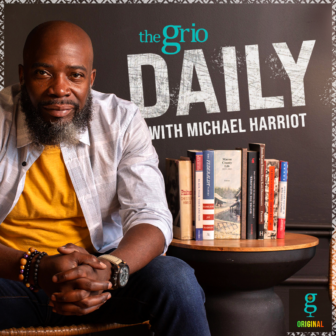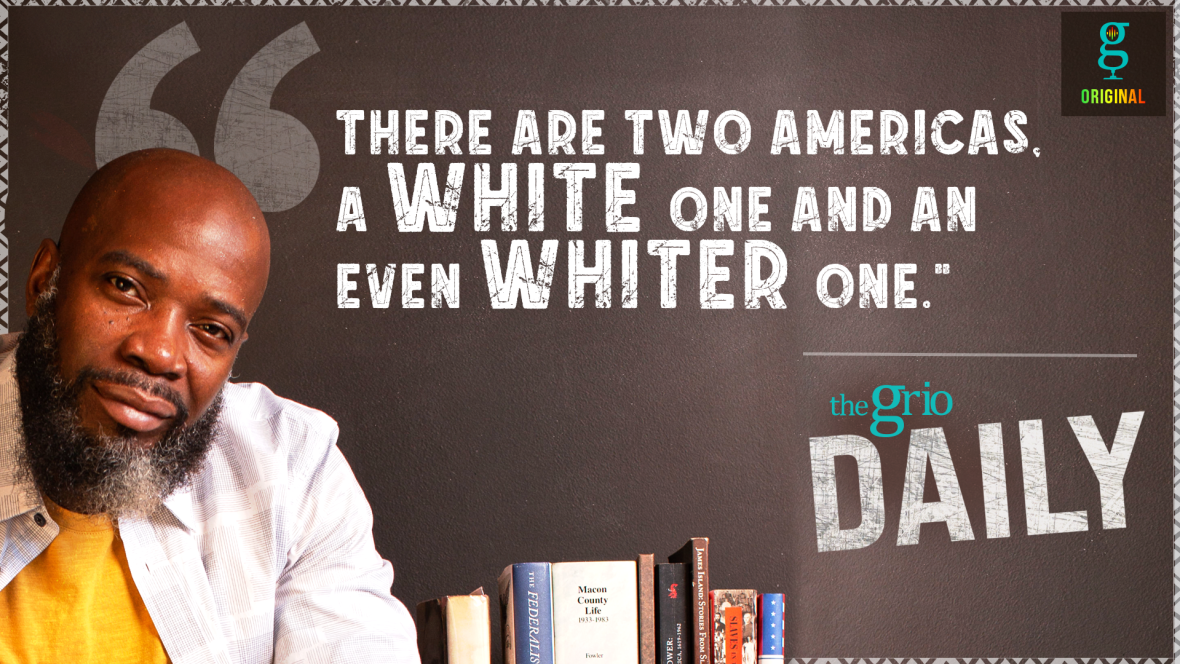

“There are two Americas, a white one and an even whiter one.” Michael Harriot takes us back to the years before the civil war and details some of the most racist laws you’ve likely never heard of.
Full transcript below:
TGDTwoAmericas0602FINAL.wav
[00:00:00] You are now listening to theGrio’s Black Podcast Network. Black Culture Amplified.
Michael Harriot [00:00:05] Hello. Do you live in a Black state? Do you live in a white state? Well. Hold on, hold on. Like I don’t mean majority Black or majority white. Like, you know, like there was a plan to create some Black states and some white states. Oh, you didn’t? Well, that’s why I want to welcome you to theGrio Daily, the only podcast that will explain when there really was a plan for two Americas. We like to think about this idea of two Americas like there’s an America where Black people live, where things are unequal, where we don’t have access to the same rights and housing and, you know, privileges that most Americans have. While that is true, there was actually a plan for two separate Americas. Most people don’t know about this, but even before the end of slavery, there were people who were trying to plan like all Black states, all white states. And that’s what we’re going to talk about today. So, first of all, you got to know, like this was always a dream of white people. West Virginia in its inception, had a plan to expel all the Black people, like there were some white people who were abolitionists in West Virginia. But they wanted to end slavery by shipping all the Black people from Africa. They just didn’t want to set them free. Because from the beginning, even before America was a thing, right? One of the apprehensions about emancipation or ending the practice of slavery was that there will be free Black people, especially men, having sex with white people and mixing up all the races. Even Thomas Jefferson wrote this, and not so in the state of Virginia. Right? He said, and I’m paraphrasing here, the difference between American style slavery and the slavery that existed in Greece and Rome was because, like, if the Greeks and Romans emancipated their slaves, they wouldn’t mess up their bloodlines, right? Because it was all white people. But in America, if we emancipate enslaved people, we would have to send them somewhere because otherwise white people wouldn’t be pure blood white people anymore. And that was an argument that existed for a long time. There were what we call sundown towns where even up until the fifties and sixties, Black people were told, You can’t be in this town after dark because we’ll hang you. But even before then, right, let’s let’s go back to slavery. Right before the Civil War, Arkansas passed the bill and the governor signed it. It was a law, right? Like the only thing that stopped them from doing it was there was this thing called the Civil War. But in 1859, Arkansas passed an expulsion bill. So what they said was all of the free Black people in the state would either have to leave the state or be sold into slavery. I mean, that was an actual law. Like they never got a chance to do it, because, first of all, like, I would’ve liked to see the white people try to make some free Black people leave. And there was other states who tried to do it. South Carolina tried to do it.
Michael Harriot [00:03:12] South Carolina even before, long before, like in the 1830s, right after they said Denmark Vesey conspired to plant a slave revolt. They passed a law that forbid Manumission, which was a slave master, freeing his enslaved people. They said that he had to get permission from the state government to do it right. And even if you were a free Black person in the state, you had to first of all, you had to pay a tax that was the equivalent of about 1300 dollars in today’s money. Right. Like just to exist as a free Black person, you had to pay this tax or leave the state. And now if you got behind on your taxes after a few years, they get the money from you by selling you back into slavery.
Michael Harriot [00:04:04] Tennessee, on the other hand, made slavery voluntary. So Tennessee, when they were debating their expulsion bill they had three choices. There were three bills that was up for proposal. One was the Volunteer for Slavery bill. Seriously, they said that you had to leave the state or anybody over the age of 18 could volunteer and pick their own master and go back into slavery. Now, the master would pay. Like they had an actual chart that was the going rates for Black human beings. And the master would pay the state, the new master, the volunteer master would pay the state for that enslaved person who chose them according to, you know, the going rate. And that money would go to help indigent white people. The second plan was to just kick out all the Black people, and if they didn’t leave, they would sell them forcibly back into slavery. And the third plan was to leave or to go back to Africa. Now, how would they going to pay for people to go back to Africa? Well, you got to you know, if they had a money to pay for your gas, I don’t know if ships use gas back then. What did ships used back then? I don’t know, blubber. Don’t know, white people’s breath. Anyway, if you didn’t have the money to pay for your travel, then you could just, like, do a period of indentured servitude. And then the master would say, Yeah, he worked hard enough. Of course, you know why people were always fair with enslaved people. White people say, Yeah, you worked hard enough, and they would give that money to the state to send you back to Africa. And the thing that stopped that was the civil war.
Michael Harriot [00:05:50] And even in states that didn’t have enslaved people like New England, like we like to think of the South as really racist. And the South is really racist because America is really racist and The South is in America, but like in New England, they would just have like festivals where the people in the town, the white people, would just go, you know, just for fun, for kicks, for, you know, S-H and giggles. They would just have festivals where they would just like, roam the streets and expel Black people. Right. Like, this was before Black people were equal citizens. And there were states that were all white from the beginning. So Oregon planned to be an all white state from beginning. Right now, they did give white people the authority to whip any enslaved person. You know, just cause I mean, I guess if you a white person in America that might have been enticing to move to cold Oregon, where it rained all the time. In Iowa, Iowa just said like no Black people and like the Kansas territory had a whole war over it. So they were always plans to be two Americas, one where white people lived free from the scourge of Black people working for free, and then regular white states and regular Blacks states.
Michael Harriot [00:07:11] Now, there were some Black states. So Black people had this secret plan to move to Oklahoma right before Oklahoma was going to be a state. Black people had a plan like we all moved Oklahoma. We will tell nobody. And then when it becomes a state, we’re going to take over the legislature because then we’ll have the right to vote, right? Because, you know, the state determined you were citizens. Right? So we go to all vote and they were going to make it an all Black state. Black people moved there. Everything was in place. But then, you know, they appoint a governor and they appoint the first legislators and the white people. The first thing they did was disenfranchize Black people and put in Jim Crow like laws. Same thing happened with other territories. There was a movement to turn the state of Mississippi Black. Remember Mississippi, South Carolina, they were close to majority Black or majority Black, but white people folded every time because they weren’t just interested in being in white places. They were interested in having total power and authority. So there were actually plans to be two Americas. That’s the reason why, again, Mississippi is Black. It’s not just slavery, but there was a plan. The Lumumba’s, for instance. Right. They were going to start this commune that was self-sufficient. You know, Mayor Lumumba in Jackson, his father was part of that plan. If you ever wondered why there are so many all Black towns like Boley, Oklahoma, in Oklahoma. Right. Why Black people could gather in Greenwood because there was that plan to turn Oklahoma Black, but it never happened.
Michael Harriot [00:08:56] I feel like it would have happened if they would have. Subscribe to theGrio Daily. I mean, if they didn’t have a lot of podcasts back then. But if they were to subscribe to theGrio Daily back then, if they would have told their friends about it, if they would have even downloaded theGrio app like on their, I don’t know whether they used. Like if they would’ve downloaded theGrio app on their telegraphs, I feel like some of this could have come to fruition. But that’s why you got to do it. And that’s why we leave you with a Black saying every episode. And today’s Black saying is, “There are two Americas, a white one and an even whiter one.” We’ll see you next time on theGrio Daily. If you like what you heard, please give us a five star review. Download theGrio and subscribe to the show and to share it with everyone you know. Please email all questions, suggestions and compliments to podcast at theGrio dot com.
[00:09:52] You are now listening to theGrio’s Black Podcast Network. Black Culture Amplified.
Being Black: The 80s [00:09:57] The Eighties gave us unforgettable songs from Bob Marley, De La Soul and Public Enemy. Being Black: The Eighties is a podcast docu series hosted by me Touré looking at the most important issues of the eighties through the songs of the decade. A decade when crack kingpins controlled the streets but lost their humanity. You couldn’t be like no soft smiling, happy go lucky drug dealer. You had to suppress that. It was a time when disco was part of gay liberation. It provided information to counter narratives that were given to gay people by the straight world. This is the funkiest history class you’ll ever take. Join me, Touré, for Being Black: The Eighties on theGrio Black Podcast Network, or wherever you listen to podcasts.